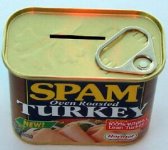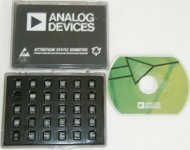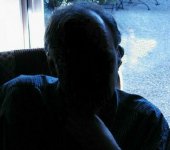hp,
yeah, i was thinking of something like that. actually, my latest idea is to have an SE line stage of some sort as an input buffer w/a little bit of gain (maybe 6dB)... this would also convert unbalanced to balanced. this gain stage would feed a Wolfson stereo attenuator chip, except i would use the two channels for the balanced signal. the output of this chip would feed complementary borbely line stages (two of them for balanced operation), also with 6dB or gain or so for a total of 12dB gain. i could also use the SE line stage here i guess but i think the wolfson requires an inverting amp after it (not sure why). i would need AC coupling for the SE input stage, but the output stage could be direct-coupled.
i know some people are going to complain about using the Wolfson IC or 2 gain stages, but i don't really know of a better way to do it practically right now. i would really like the attenuation range and resolution that something like the Wolfson provides. this solution also provides full balanced in/out with a minimum of fuss.
anyway, the borbely SE line stage is first up on the prototyping list, so we'll see how it sounds.
marc
yeah, i was thinking of something like that. actually, my latest idea is to have an SE line stage of some sort as an input buffer w/a little bit of gain (maybe 6dB)... this would also convert unbalanced to balanced. this gain stage would feed a Wolfson stereo attenuator chip, except i would use the two channels for the balanced signal. the output of this chip would feed complementary borbely line stages (two of them for balanced operation), also with 6dB or gain or so for a total of 12dB gain. i could also use the SE line stage here i guess but i think the wolfson requires an inverting amp after it (not sure why). i would need AC coupling for the SE input stage, but the output stage could be direct-coupled.
i know some people are going to complain about using the Wolfson IC or 2 gain stages, but i don't really know of a better way to do it practically right now. i would really like the attenuation range and resolution that something like the Wolfson provides. this solution also provides full balanced in/out with a minimum of fuss.
anyway, the borbely SE line stage is first up on the prototyping list, so we'll see how it sounds.
marc
Borbely balanced SE JFET design...
hmm so i was about to order all the parts i need to wire up the Borbely balanced SE design, then i realized... the schematic on his website (the EB-2000/402) and the one in the 6/99 issue of Audio Electronics (the JFET Part II article) are slightly different... he mentions in the web version that they have "upgraded the basic design new constant current source and complementary JFET output stage..." this new source follower is instead of the version of the White cathode follower shown in the article. should i assume the web version is the "latest and greatest," and build that? i guess if Mr. Borbely calls it an "upgrade" then it must be better... ?
hmm so i was about to order all the parts i need to wire up the Borbely balanced SE design, then i realized... the schematic on his website (the EB-2000/402) and the one in the 6/99 issue of Audio Electronics (the JFET Part II article) are slightly different... he mentions in the web version that they have "upgraded the basic design new constant current source and complementary JFET output stage..." this new source follower is instead of the version of the White cathode follower shown in the article. should i assume the web version is the "latest and greatest," and build that? i guess if Mr. Borbely calls it an "upgrade" then it must be better... ?
dorkus said:hp,
i know some people are going to complain about using the Wolfson IC or 2 gain stages, but i don't really know of a better way to do it practically right now. i would really like the attenuation range and resolution that something like the Wolfson provides. this solution also provides full balanced in/out with a minimum of fuss.
marc
If I may suggest, Burr-Brown (now owned by my employer, TI), makes a stereo attenuator chip (PGA2310) with performance very similar to the WM8816, only with a much better pinout- digital stuff is on one side of the chip, analog on the other side, allowing the part to straddle analog and digital ground planes making board layout MUCH easier and making it easier to keep digital crud out of the analog circuits. Also, the op-amps are internal (but I guess that limits tweakability). The PGA2310 can be sampled from the TI web site, and can be purchased in onesy-twosy quantities from Digikey.
For balanced I/O, Burr-Brown also makes the INA2134/7 and DRV 134 balanced line receiver and balanced line driver. Also readily available at Digikey.
Back to my original questions- I can see that op-amps aren't so bad after all... I still would like to know why any gain is needed in a "preamp".
MR
MR,
i've ruled out the PGA2310 because it has an internal opamp, and a mediocre one at that (i think it is based on OPA604 or something). the wolfson is a passive part so it gives us more flexibility with choosing our own active circuitry.
harry was being sarcastic. most of us think that IC opamps suck. you should be careful how you use the word "opamp" though. i think you confusing it with IC opamp. an operational amplifier is simply a circuit that amplifies the difference between its two inputs, thus performing an "operation" in a mathmatical sense. you can make an opamp with discrete transistors or you can use an IC. many people think opamps sound bad, possibly due to the tremendous amount of negative feedback they require to limit gain. i tend to agree, though i am willing to try discrete versions. i am also looking at good ICs (none made by your company i'm afraid) but primarily for comparison purposes with the discrete circuits. while ICs can still sound pretty good i don't expect them to hold up to the discretes. in any case, this and your other questions are probably better left for a different thread.
no offense, but i think you would best not suggest IC parts (other than attenuators like the Wolfson) in this thread at the moment... most of us refuse to touch them so it's probably a waste of time, and we're busy tweaking some other discrete circuits anyway. unless you know of some new miracle IC that sounds magnificent...
most of us refuse to touch them so it's probably a waste of time, and we're busy tweaking some other discrete circuits anyway. unless you know of some new miracle IC that sounds magnificent...
cheers,
marc
p.s. yes, we need gain. my sony SACD player has a pretty low output level and i want the flexibility of a wide volume range.
p.p.s. harry: haha, yeah really...
i've ruled out the PGA2310 because it has an internal opamp, and a mediocre one at that (i think it is based on OPA604 or something). the wolfson is a passive part so it gives us more flexibility with choosing our own active circuitry.
harry was being sarcastic. most of us think that IC opamps suck. you should be careful how you use the word "opamp" though. i think you confusing it with IC opamp. an operational amplifier is simply a circuit that amplifies the difference between its two inputs, thus performing an "operation" in a mathmatical sense. you can make an opamp with discrete transistors or you can use an IC. many people think opamps sound bad, possibly due to the tremendous amount of negative feedback they require to limit gain. i tend to agree, though i am willing to try discrete versions. i am also looking at good ICs (none made by your company i'm afraid) but primarily for comparison purposes with the discrete circuits. while ICs can still sound pretty good i don't expect them to hold up to the discretes. in any case, this and your other questions are probably better left for a different thread.
no offense, but i think you would best not suggest IC parts (other than attenuators like the Wolfson) in this thread at the moment...
cheers,
marc
p.s. yes, we need gain. my sony SACD player has a pretty low output level and i want the flexibility of a wide volume range.
p.p.s. harry: haha, yeah really...
Re: No gain no pain
yeah seriously! you op amp geeks (i used to be one of them, sort of ), with all your talk about the pie-in-the-sky opamp with infinite open-loop gain, infinite-bandwidth, zero output impedance, blah blah blah...
), with all your talk about the pie-in-the-sky opamp with infinite open-loop gain, infinite-bandwidth, zero output impedance, blah blah blah... 
HarryHaller said:What's an op-amp guy got against a little gain anyway?
yeah seriously! you op amp geeks (i used to be one of them, sort of
Op-Amp Geeks!
I would like to know if any of op-amp fans have built a discreet version of their favourite op-amp and compared the two under the same conditions ie. gain, supply voltage ....
I have and gave up on op amps. years ago, granted they got a lot better over the years but........
Also, all you have a black box with fairfy little control of what happens inside. A cop out in my book.
Jam
P.S. Most of you guys are missing what Harry is trying to say. Maybe more hand holding is in order.
I would like to know if any of op-amp fans have built a discreet version of their favourite op-amp and compared the two under the same conditions ie. gain, supply voltage ....
I have and gave up on op amps. years ago, granted they got a lot better over the years but........
Also, all you have a black box with fairfy little control of what happens inside. A cop out in my book.
Jam
P.S. Most of you guys are missing what Harry is trying to say. Maybe more hand holding is in order.
Re: Op-Amp Geeks!
what IS he trying to say? you seem to be his soulmate, his partner in crime, his butt buddy, whatever you want to call it... so you need to translate for us.
p.s. when you say you gave up on opamps, do you mean ICs specifically, or the whole topology altogether?
jam said:
P.S. Most of you guys are missing what Harry is trying to say. Maybe more hand holding is in order.
what IS he trying to say? you seem to be his soulmate, his partner in crime, his butt buddy, whatever you want to call it... so you need to translate for us.
p.s. when you say you gave up on opamps, do you mean ICs specifically, or the whole topology altogether?
Op- Amp Junkies!
I do not by any stretch of the imagination claim to be Harry's best bud. Be he has offered everyone a tremendous amount of information to steer people in the right direction but most people miss it.
I am speaking fom experience because I have gone down that path before and I have to agree with most of his conclusions. He bullds stuff and has the technical background to back it up rather than pontificate (is this a good word) from some spec sheet or text book. He has a hint of sacarsm ( well a lot) in some of his replies but I can understand why....... Try beating your head against the wall a few times.
Most of you will agree that Nelson Pass builds some of best audio gear and I can't seem to find any op-amps in his products. Anyone wonder why?
Jam
P.S. I need a new picture of Harry, I have a new set of horns for him.
I do not by any stretch of the imagination claim to be Harry's best bud. Be he has offered everyone a tremendous amount of information to steer people in the right direction but most people miss it.
I am speaking fom experience because I have gone down that path before and I have to agree with most of his conclusions. He bullds stuff and has the technical background to back it up rather than pontificate (is this a good word) from some spec sheet or text book. He has a hint of sacarsm ( well a lot) in some of his replies but I can understand why....... Try beating your head against the wall a few times.
Most of you will agree that Nelson Pass builds some of best audio gear and I can't seem to find any op-amps in his products. Anyone wonder why?
Jam
P.S. I need a new picture of Harry, I have a new set of horns for him.
i know you are not his butt buddy
just kidding jam. was throwing in a little sarcasm of my own. hope you were not offended.
so, i guess you are basically not a negative feedback fan. i don't blame you. i'm looking forward to building the Borbely SE circuit, i have not tried anything SE in my system yet so it will be an interesting experiment. btw should i build the one w/complementary output followers or the "White cathode follower" version? i guess i should try both but i'm just so lazy... so i will build the complementary version to start cuz it has fewer parts
just kidding jam. was throwing in a little sarcasm of my own. hope you were not offended.
so, i guess you are basically not a negative feedback fan. i don't blame you. i'm looking forward to building the Borbely SE circuit, i have not tried anything SE in my system yet so it will be an interesting experiment. btw should i build the one w/complementary output followers or the "White cathode follower" version? i guess i should try both but i'm just so lazy... so i will build the complementary version to start cuz it has fewer parts
Who is Harry's best Buddy?
No, I never said that I hated negative feedback! Applied correctly it is very useful especially in power amps.
When you build the Borbely let me know, I might have a few ideas for you to try.
Jam
Me offeneded naw!, By the way your mum wears army boots!

No, I never said that I hated negative feedback! Applied correctly it is very useful especially in power amps.
When you build the Borbely let me know, I might have a few ideas for you to try.
Jam
Me offeneded naw!, By the way your mum wears army boots!
his soulmate!!!!!!!!!??????
Jam is the guy that put horns, a tail, and a pitchfork on my posted picture. With friends like that....... I am perfectly content to be the man everyone loves to hate. It's a dirty job but someone has to do it. Mr. Pass gets all the hero worship and deserves most of it.
H.H.
Jam is the guy that put horns, a tail, and a pitchfork on my posted picture. With friends like that....... I am perfectly content to be the man everyone loves to hate. It's a dirty job but someone has to do it. Mr. Pass gets all the hero worship and deserves most of it.
H.H.
- Status
- This old topic is closed. If you want to reopen this topic, contact a moderator using the "Report Post" button.
- Home
- Amplifiers
- Solid State
- Son of Dork: Active Circuitry


